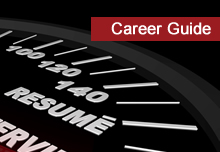Common mistakes in job hunting
-
Not taking action.
Putting off decisions, phone calls, leads, writing, looking. Not doing anything constructive. Making excuses and limiting yourself. Students usually leave the issue of finding work until the end of their final year, or after graduation. You must address this at the beginning of your final year with the objective of either finding work, or having some employment prospects before you graduate. -
Focusing on advertised positions.
At least 80% of the employment opportunities are never advertised. You must learn how to do basic research to be able to reach the “hidden market” -
Not reflecting enough.
Not thinking about what is wanted, ideal, or possible. Jumping to the search and jumping too often to the wrong job, simply because it appeared first. -
Not taking advantage of all potential resources while searching.
Overlooking the assistance and leads that can be found in talking with friends, parents, professors, etc. Not using libraries. Hesitating to call people unknown to you. -
Not exploiting skills and experience.
Not understanding the unique value, strengths and marketability of your past. -
Not being committed to the job search.
Not making adequate time for preparing and searching;. Hoping something will turn up. -
Not empathising with the employer's perspective.
The employer has needs, timeframes, problems and constraints that may or may not be compatible with yours. -
Not being positive.
Underestimating the power of attitude in the process, the employer, and you. -
Not having the marketing package prepared
The challenge for employment seekers today is to become proficient at finding work. Anyone lacking this skill will be unemployed for a long time. Employment seekers must learn how to create a variety of tools that are marketing oriented and focused on the needs of the employer.( cv, covering letter, online applications etc) -
Not anticipating and practicing for an interview.
Not being able to relate your abilities to the employer's needs. Not role-playing and formulating a strategy for success. -
Not following up in a professional manner.
Thank-you letters, even after rejections, can make a name for you in what may prove to be a small, closely knit profession.
The Job Hunt, by Robert B. Nelson





